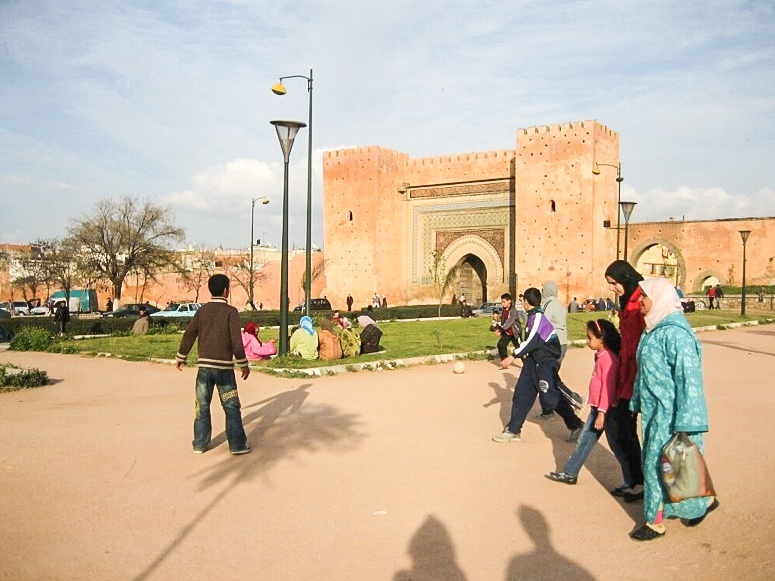The most humble of Morocco’s four imperial cities, Meknes is an overlooked destination.
But less tourists often means more opportunity for authentic experiences. Visiting places off the beaten path can be very rewarding. We saw Meknes as a quick stop-over – a place to spend the night after a day trip to Moulay Idriss, the sacred Muslim town near the Roman ruins of Volubilis. Thankfully, we extended our stay to get to know this everyday town a bit better.
From the train station in Fes, we caught the next train out to Meknes – less than a half hour wait. Having travelled by bus for most of our time in Morocco, the train was a welcome respite. We watched the scenery peacefully pass and within an hour, arrived to the “Versailles of Morocco.”
Immediately, we felt a sense of calm compared to the frenzy of Fes. After checking in to Riad Idrissi, we headed out to explore the town. We receive noticeably few offers from people wanting to be our guide and less hassle from shopowners. This alone made our visit much more enjoyable.
Compared to other cities in Morocco, Meknes has a more westernized presence.
Some opt to wear the long, druid-like robes we first saw in Marrakech, but many more wear modern clothes. We also noticed young women choosing to forego the “hijab,” the iconic Muslim headscarf.
While the city feels progressive in ways, there are still traditional aspects like men-only cafes, a typical sight in Muslim cultures (as well as others.) Here, men sitting around drinking tea, smoking and playing cards. We first saw this phenomenon during our wanders in Istanbul, Turkey. While we could be mistaken, we get the impression that Muslim societies don’t necessarily grant men and women the same amount of leisure time.
After a lunch of fresh sandwiches from a shop on Rue Sekkakine, we headed to the Medina (“Old City”) next. The scene was fascinating. In our “Saunter through the Souqs” self-guided tour, we visited the Okchen Market (known for embroidery) and Quissariat ad-Dahab (known for jewelry).
Everywhere we looked, artisans and craftspeople were hard at work in their individual workshops.
One man sewed elaborate details on special occasion robes, while another carved wood to create ornate tables and headboards. People also spun silk thread out in the street – a common sight in Marrakech and Fes as well. In the Spice Souk, vendors sold a variety of Arabic spices, herbs, nuts and incense.
While wandering, we noticed candid photos of the King of Morocco posted in various restaurants and shops. Since 1999, King Mohammed VI of the Alaouite dynasty has been in power. Currently, he is one of the richest kings in the world.
In the heart of the Medina, near the iconic Bab Mansour Gate, is the vast square, Place el Hedim. This is where locals come to gather, shop and socialize. For those who don’t get their fill at the souks, the surrounding narrow streets offer a wealth of flea markets and individual vendor stalls.
After a day of exploring, we began the walk back to our peaceful guesthouse located on the outer edge of the Medina.
Entering our neighborhood, we noticed a group of local school kids huddled in a group outside a little shop built into the side of a building. The storefront, normally hidden by shutters, was open. Inside, a man in an all white uniform, perched himself next to a hot stove in the tiled little alcove. The kids watched in anticipation as he methodically dipped a ring of sugary goodness into bubbling hot water to create “Sfenj,” tasty Moroccan doughnuts.
We dutifully joined the kids, waiting patiently for the street vendor to fry up each doughnut on the spot. Rarely looking up as he made his distribution, the man did a double-take when he caught a glance of us – a good 25 years older than his normal target audience.
We took our hot, perfectly-cooked sugary creations and continued our walk – savoring each bite slowly and gratefully, enjoying the last hours of our afternoon.

